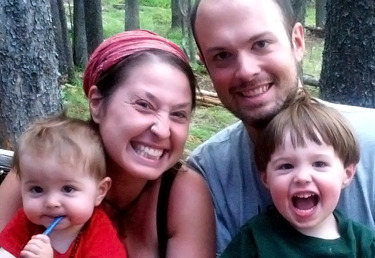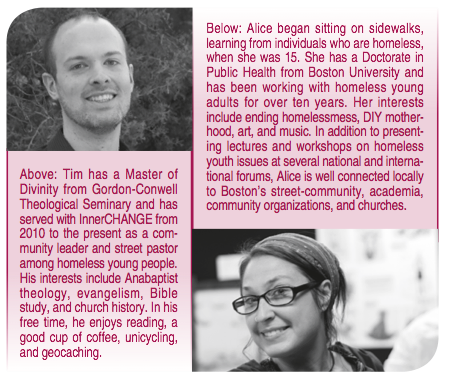By Vicki Sairs
Originally Published on Mennonite World Review, reprinted with permission
Every day, we hear about more and more churches that are being planted in Boston, and Tim and Alice Colegrove are a big part of that. They are planting a church in Jamaica Plain within the Conservative Mennonite Conference and we are excited to share their story today. If you would be interested in getting involved in the church the Colegrove’s are planting, please contact them at timothy.colegrove@gmail.com

Above, Tim and Alice Colegrove with their sons River and Elias
Together, Alice and Tim bring a powerful combination of gifting and experience to the task of church planting. For the last four years, they’ve worked with homeless youth and young adults in Boston through InnerCHANGE, a Christian order among the poor. They’ve acted as advocates and friends for young people on the streets, trying to provide “a healthy community where healing and hope can be found.”
Now they sense a call to step back from their street ministry and focus on building a church in their neighborhood, which they describe as “incredibly diverse” and which they enjoy tremendously.
Here’s how they describe that call: “Our vision is to plant a multi-ethnic evangelical Anabaptist church in the city of Boston committed to discipling new believers, breaking down socio-economic barriers, and gathering an eclectic community around Jesus’ table.”
It will, they say, take “outside-the-box thinking,” but their goal is “to build a church where people from all walks of life can come and experience new life in Christ.”
They see a “great need for church growth and Gospel witness” in Boston and believe that the CMC’s “historic emphasis on peace and simplicity” uniquely position them “to offer a fresh angle on Christian faith… . Boston is rich soil for Kingdom movements towards racial reconciliation, peacemaking, and economic justice.”
“Part of our vision for a church will springboard from the ministry we’ve had with homeless youth and folks on the street. We would love to be able to have a church where they are welcome…where church and non-church people, poor and rich, intellectuals and non-intellectuals come around the table.”

Alice brings over a decade of experience in working on issues of homelessness and public policy to this topic of empowerment. She has worked with young people on the streets, service providers, churches, and academics; at the policy level, she’s worked at the state level in Massachusetts and with the governments of Romania and Peru.
“All those voices need to be heard,” she explained, “to create a bigger picture.” Navigating those worlds takes skill. “God has blessed me with the ability to speak the languages of those various worlds. I have navigated that in the secular world and I can bring that to the church, meeting folks from a variety of backgrounds across the table.”
Tim added, “Secular people are working on this. The church should be even more capable of doing that… .It’s a challenge to the church that secular groups are able to come together. We’d like to see a congregation that meets that challenge.”
Alice said, “At the policy level, it’s not only a good idea [that the poor are included in discussions] … the poor are required to be there. Is that the same in the church?”
Their focus will be on proclaiming the Gospel and making disciples in Jamaica Plain.
Tim explained that there already are “homeless churches and outdoor churches. The drawback is they don’t bring any relational wealth or social capital to the people on the street… It’s hard to overcome the barriers of addiction, poverty, lack of education, unless you have people who can support you in that. We want to build a church that can do that.”
Alice used the parable of the good Samaritan: “Part of our job is being the Samaritan, sitting with the bro- ken, tending to their wounds. But we still need an inn to take them to. An inn is not just filled with the broken, it’s filled with all sorts of people. We want our friends to come from the streets and find healing, and we want folks who are stable to be with them.”
